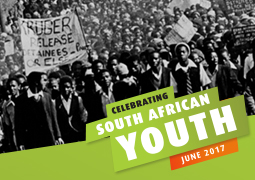
As South Africa comes to the close of another Youth Month – the 41st since Soweto students changed the course of history – the Deputy Speaker to Parliament, Mr LechesaTsenoli, called young people “to the front”. “That is where you belong,” he said in Parliament last week. “Educate yourselves. Acquire skills, seek opportunities to create jobs.”
Alongside his counterpart in the National Council of Provinces, Mr Tsenoli is responsible for sectoral events such as youth parliaments. He took the opportunity to appeal to the emerging generation of new leaders to “create social interventions in your neighbourhoods that will make a big difference to the quality of life of those who come after you and those who have come before you”.
He said young people, now more than ever, must intervene in their neighbourhoods and communities, especially to protect the more vulnerable. “Young people see the problems in their neighbourhoods.” He said it was up to them to stand up and be counted when domestic violence placed people at risk.
When it comes to crime and violence, young people must not be the perpetrators. “Protest is good,” he said. “It opens our eyes to what needs to happen [and] must lead to practical solutions.” But he urged young citizens to reject anything that “smells of the criminality of violence. Not in my family. Not in my neighbourhood. Not in my community.” He urged young people to be the ones to “break the walls of silence that often hides criminality”.
He especially appealed to the youth to stop being only job seekers, and instead to use their creativity and initiative to become job creators. He encouraged the youth to set up partnerships and making use of the opportunities provided by the public sector to innovate and introduce solutions to the problems they see around them.
The Deputy Speaker’s message for the youth went further. “Never lose the great value of respect for the elderly. They have experience. They know what has happened in the past. Draw as much as possible from their experience and their wisdom.”
He reminded the young of their responsibility to keep alive the values borne out of the struggle against apartheid. “Those values do not die.”
He warned it was up to the youth to halt the “the eroding influence of greed, of acquisitiveness and individualism that kills the sense of community that we [in the ANC] have espoused as an approach to dealing with problems”, which comes from “deep African values, from a non-racial system that looks at people as human beings, irrespective of where they come from and their background”.
He listed what he, as a veteran of the Mass Democratic Movement, expects of the upcoming generation. Respect people as people. Demand equal pay for equal work. Do away with discrimination wherever it raises its ugly head. Be consistent. Do not allow cultural or religious reasons to “suppress the potential creativity that society needs to solve the many problems that we have in South Africa”.
“Those values are absolutely crucial,” he said, returning again and again to the three major challenges facing South Africa today: poverty, inequality and unemployment. “These will only be effectively dealt with if all people, irrespective of their race, colour, creed or gender, get involved in solving the problems and creating solutions.”
His strongest words were reserved for an appeal to end violence against women and children, which he called “one of the crudest manifestations” of the problems our society faces.
This scourge he attributed to “the past traumatisation that occurred in our society. Open state violence inevitably got into families and individuals as a method for resolving issues.”
Despite concerted public reconciliation efforts of the past, South Africa has still not yet found a way of resolving conflict, even within our communities. “We have not produced infrastructure in our society to deal with healing the past.”
Mr Tsenoli wants to see an urgent end to violence in the home, at the workplace, on farms and in the streets, but he cautioned that healing needs state intervention. South Africa needs to first deal with the violence that people suffered in the past at the hands of the state and certain employers by engaging in individual, neighbourhood and community-linked initiatives to tackle these problems.
Moira Levy
27 June 2017

